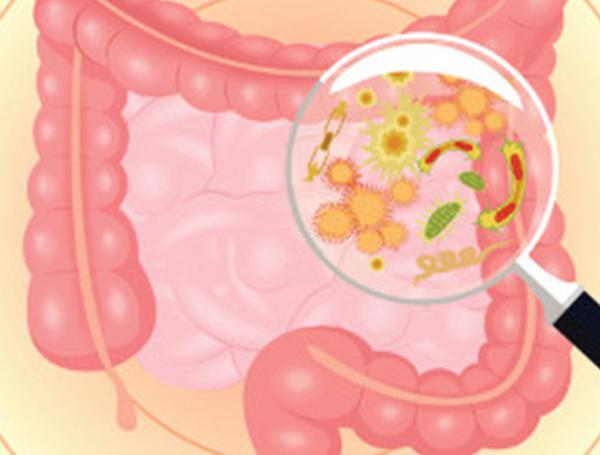Gut Bugs May Convert High-Fat Fare into Cancer Risk

A team of IRP researchers found evidence in mice that the combination of high-fat food and obesity-associated microbes in the digestive system causes genes in the colon to behave more like they do in colon cancer.
Researchers have a long history of fattening up mice to gain insight into the causes and consequences of weight gain in the human body. In one of the more recent studies of this kind, a team of IRP researchers found that that a high-fat diet consistently altered the collection of microbes residing in mice’s digestive tracts and that this diet-microbe combination might pre-dispose the mice – and, potentially, obese humans – to colon cancer by triggering certain changes in how genes behave1.
Obesity is associated with a wide array of health problems, from cardiovascular disease to diabetes to cancer. Paul Wade, Ph.D., an IRP Senior Investigator and the study’s senior author, has been trying to understand those connections by examining the effect of weight gain on the epigenome, the set of chemicals that regulate how active our genes are.
“We’re focused on how the environment influences human health, and one of the most important ways that we interact with our environment is what we put in our mouths,” he says.
In 2014, Dr. Wade’s team published a study that found obese mice experienced changes to their epigenomes that caused certain genes in colon cells to behave more like they would in colon cancer, a change that Dr. Wade believes might predispose them to developing the disease2. However, it was unclear whether those changes were due to the animals’ weight gain, their high-fat diet, or the way the diet altered the set of microorganisms in their digestive systems, known as the gut microbiome.
To answer that question, the researchers once again plied their mice with delicious, high-fat rodent chow and compared the resulting changes to their gut microbiomes and epigenomes to those of lean mice fed a normal diet. Just like in many previous studies, the high-fat diet altered the animals’ gut microbes in a consistent manner, even before the mice had gotten too big for their britches. What’s more, just like in the 2014 study, the team found that several hundred genes in the colon cells of the obese mice began to behave more like they would in colon cancer, which was not the case in the lean mice.
The group then went a step further by transplanting the gut microbes of either the obese or lean mice into ‘germ-free’ mice that had no gut microbes to begin with. Afterwards, the microbiomes of the germ-free mice came to resemble those of their donors, but only if they were also fed the same diet as their donors as well. Moreover, the germ-free mice given microbes from obese mice showed the same changes in cancer-related gene activity as their obese donors – but, again, only when they consumed a similarly high-fat diet.
“It’s not just diet and it’s not just the microbiota; it’s the combination of the two” that nudges genes into acting more like they do in colon cancer, Dr. Wade explains.
His team now plans to use a mouse model of colon cancer to see if those diet- and microbiome-related shifts in gene activity truly increase the likelihood of developing cancer. If they do, and if the same epigenetic changes occur in obese humans, it may be possible to decrease our own risk of cancer and other diseases by consuming certain substances meant to alter our gut microbiomes.
“One of the things that I think is really exciting is the potential to influence one’s disease risk by modifying what’s available for your gut microbiota to digest,” Dr. Wade says. “It’s hard to lose weight, and it’s hard to keep weight off, so if there are supplements to the diet that can help people, I think that’s a very exciting prospective use of studies like ours.”
This post is the first in a bi-weekly series, called “Test Tube Tuesdays,” that highlights recent IRP studies, so check back here every other Tuesday for the latest happenings in IRP science!
Subscribe to our weekly newsletter to stay up-to-date on the latest developments in the NIH Intramural Research Program.
References:
[1] An obesity-associated gut microbiome reprograms the intestinal epigenome and leads to altered colonic gene expression. Qin Y, Roberts JD, Grimm SA, Lih FB, Deterding LJ, Li R, Chrysovergis K, Wade PA. Genome Biol. 2018 Jan 23;19(1):7. doi: 10.1186/s13059-018-1389-1.
[2] Obesity, rather than diet, drives epigenomic alterations in colonic epithelium resembling cancer progression. Li R, Grimm SA, Chrysovergis K, Kosak J, Wang X, Du Y, Burkholder A, Janardhan K, Mav D, Shah R, Eling TE, Wade PA. Cell Metab. 2014 Apr 1;19(4):702-11. doi: 10.1016/j.cmet.2014.03.012.
Related Blog Posts
This page was last updated on Tuesday, January 30, 2024
